Did you know that marking the beginning of each new year on January 1st is a relatively new custom in Ireland? Believe it or not, this practice is less than 300 years old.
Until recent years New Year's Eve and New Year's Day celebrations were very subdued in Ireland. The Irish national folklore archive does not hold much evidence of these dates being cause for major festivities in centuries past.
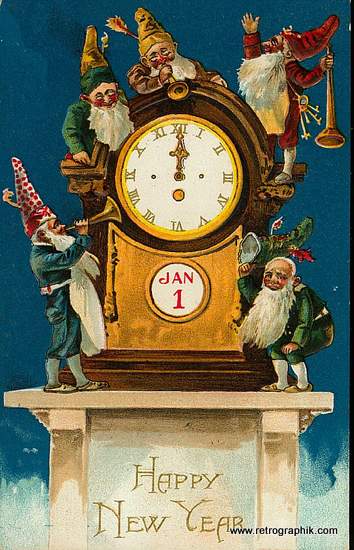
Table of Contents
Is New Year Just Any Day?
Now let's face it, the world just keeps on spinning around the sun, and takes a little over 365 days to accomplish this feat. The exact date when we decide this cycle begins and ends, and a new year should be celebrated, is completely arbitrary.
This blog post to the history of New Year celebrations, and how January 1st became the arbitrary day chosen to celebrate the New Year on both sides of the Atlantic.
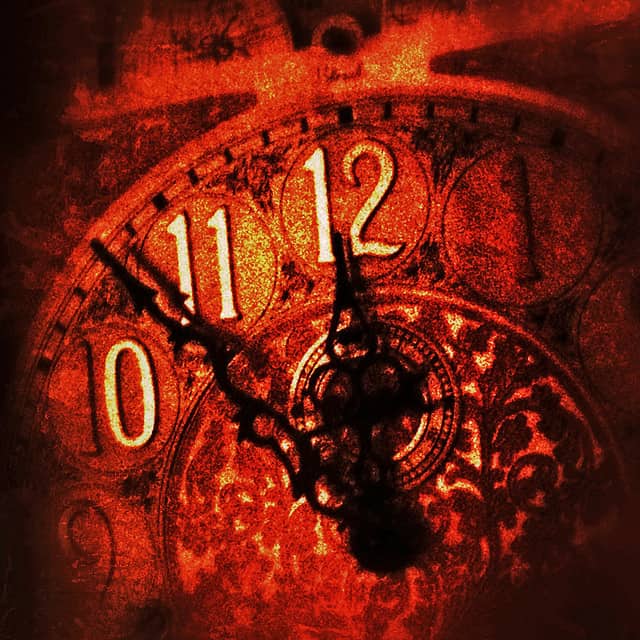
A New Year History Lesson
It was not until 1752 that the New Year was officially decreed to start on January 1st in Ireland. This was the year when Great Britain adopted the Gregorian calendar rather than the Julian calendar. Since Ireland was ruled by England at that time, we too adopted the new date to mark the New Year. Up until then the New Year was legally declared to start on March 25th.
Now until Christianity took hold in Ireland the New Year had always been celebrated at Samhain or Halloween on the last day of October when the harvest had been gathered.
Even after the church officially changed the start of the New Year to March 25th, many rural Irish folk continued to celebrate Samhain as the start of the Celtic new year, and St. Brigid's Day on February 1st as the beginning of spring.
There are many old Irish customs and traditions associated with Halloween and St. Brigid's Day, but they're are relatively few associated with our celebration of the New Year.
January Vs. March For New Year Celebrations
Originally Julius Ceasar decided January 1st was the perfect day to start the New Year since the month was named after the Roman god, Janus, who had two faces, one looking forward and one looking backward. Janus was also the god of doors and gates, so good ol' Julius Caesar decided this symbolism was perfect for marking the New Year.
After Rome fell in the 5th century Christianity spread throughout Europe. Celebrating the new year on January 1st was seen as a pagan Roman tradition, so the powers that be in the Christian church decided to move the date to March 25th. This was the feast of the Annunciation, when Mary was told by the Angel Gabriel that she was to be the mother of Jesus.
Now there was little unity back in those days. Some countries chose Christmas Day, December 25th to mark the start of their new year, while others chose to change the day every year to coincide with Easter Sunday.
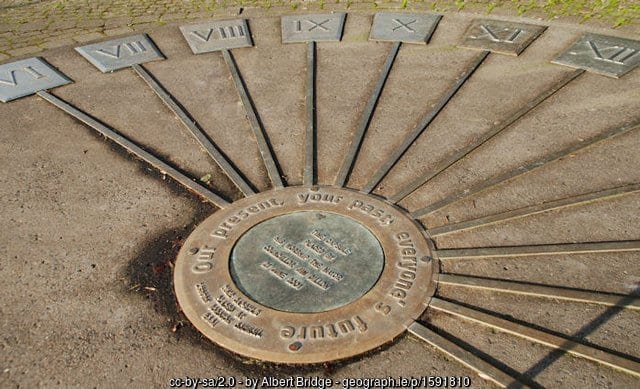
Out Of Sync With The Solar Year
However, troubled times were a brewing for calendar watchers. When Julius Caesar created his calendar based upon the astronomical spin of the world around the sun, he counted 365 days but failed to calculate the extra 6 hours required to complete the cycle. Calendrical chaos ensued as the Julian calendar became misaligned with the solar year.
By 1582 the difference had grown to 10 days, requiring holidays and feasts to be changed frequently to match the solar year. Pope Gregory XIII was fed up with having to re-set the date for the Spring Equinox and Easter each year.
And so he decided to devise a new calendrical system which implemented the addition of a single leap day every four years to keep the solar years and calendrical years all in sync. He also decided to restore January 1st as the official first day of each year.
Catholic countries, like France and Italy, adopted the new Gregorian calendar quickly. But Protestant countries like England were hesitant to accept the calendar created by a Roman Pope.
Since Ireland and America were ruled by England, the acceptance of January 1st as the day for celebrating the New Year did not occur until 1752.

Old Irish New Year's Customs
And so you see, celebrating New Year in January is a custom less than 300 years old in Ireland.
To tell you the truth, in times gone by, the main thing Irish folks did on New Year's day was simply nothing at all.
An old custom dictated that nothing should be brought into or out of a house on New Year's Day. All water that might be required should be gathered from the well before sunset on New Year's Eve. All water, both clean and dirty had to be kept inside the house until after the dawn of day on the 1st of January.
The night of December 31st was deemed the anniversary of the date Jesus changed water into wine at the wedding feast of Cana, and for this reason no water should be thrown out, or added overnight for fear the Lord would think the household greedy.
In last year's New Year's post I shared some other customs like once again lighting a candle in the window, and how bread was thrown at the door to ward off hunger in the coming year.

The Celtic New Year
In ancient Ireland the Celtic New Year began at Samhain (pronounced as sow-in with sow as in a pig), which has evolved into our modern day Halloween celebration. It also gave rise to all saint's day on November 1st, and all souls day the following day.
Other Celtic festivals include imbolc at the start of February, bealtaine at the start of May, and lughnasadh at the beginning of August. These were all celebrated on cross quarter days between the equinoxes and solstices.
The winter solstice was very important to the Celts as is evidenced by the alignment of the tomb at Newgrange to the rays of the rising sun on the mornings of the winter solstice.
This custom was also observed in Scotland and Wales and other gaelic countries. The Celtic new year was actually at the beginning of winter, at the end of the harvest season.
It was one of the Celtic fire festivals and bonfires were lit all over the country by the ancient Celts. They dressed in costumes to ward off evil spirits, because they believed the veil between the spirit world and the real world was at its thinnest. The sat beside the flames of a communal fire for protection.
The Celts created lanterns out of turnips (rutabagas) rather than pumpkins. The light helped them remain in the human realm and not be spirited away during the festivities. They feasted on apples and nuts and the fruits of the harvest.
It was the time of year for divination, witches from the otherworld and fairies. If you're interested in Celtic mythology and legends, I published a post to help you get started exploring these ancient Irish stories.
Foreseeing the Future at New Year
It does not appear our forefathers made New Year's resolutions as we do today. They were not so keen on goal setting and planning, but seemed to trust their future to fate, and of course the weather, which dictated the destiny of a rural farming people, like the Irish.
One natural sign used as an omen of good and bad fortune at New Year was the water level of local rivers. If the river was running high on New Year's Day, it was a sign that commodities and food would be expensive that coming year. If the river ran low then necessities would be inexpensive.
Another old superstition dictated that no money should be spent on New Year's Day for fear it would foretell a year of major expenses ahead.
If someone visited a house on New Year's Day they should always bring a gift, since their lack of giving might indicate the house would be empty throughout the coming year.
As a result, little visiting was done on this date. People believed that by giving away something from their own home they might be giving away their luck. It was safest to sit home and keep everything you possessed under your own roof, rather than visiting neighbors and sharing your luck.
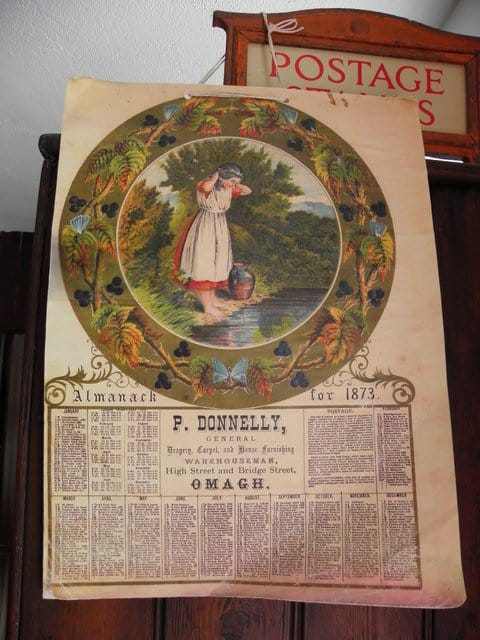
The Cycle Of Life
And so, January 1st was a very quiet day in Ireland in olden times. Women's Little Christmas, celebrated on January 6th, was marked with far more festivities. Women were celebrated for all their work over the twelve days of Christmas.
Withered holly was put away and saved so that it could be burned in the fire on Pancake Tuesday, the day before Lent began.
Important Irish festivities were linked through ritual and January 1st did not feature much in this traditional holiday pattern. After Christmas ended on January 6th, the next big day for celebration was February 1st, St. Brigid's Day, when the coming of spring was welcomed, and the cycle of life was renewed by nature.

Celebrating The New Year Irish Style
And so, if like me you find yourself a little under-awed by the razzmatazz and hoopla of New Year celebrations, don't mentally beat yourself up.
As you sit at home, watching the craziness of celebrations at College Green in Dublin, or at Times Square in New York, just raise a glass and toast your Irishness.
Let's face it, our avoidance of setting resolutions we know we will fail to keep, and our inclination to sit back, relax and do nothing as we ring in the New Year, are simply expressions of our genetic inheritance.
The Irish have never done much to celebrate a January New Year, and so this new year's eve, I plan to religiously adhere to that age old tradition.
Happy New Year To All!

Slán agus beannacht,
(Goodbye and blessings)
Mairéad -Irish American Mom
Pronunciation - slawn ah-gus ban-ock-th
Mairéad - rhymes with parade
Here are some more of my Irish Christmas recipes and ramblings:
Christmas
- Sending Seasons Greetings By Christmas Card
- May the Blessings Of Christmas Be With You
- Fifteen Sparkly Fun DIY Glitter Ornaments for Christmas
- Brighten Your Christmas With DIY Homemade Candles
Blessings
- May The Road Rise To Meet You Irish Blessing Plate Day Twelve Gift
- God Bless The Corners Of This House
- The Magic Of Christmas Lingers On
- Irish Sayings And Blessings For Troubled Times


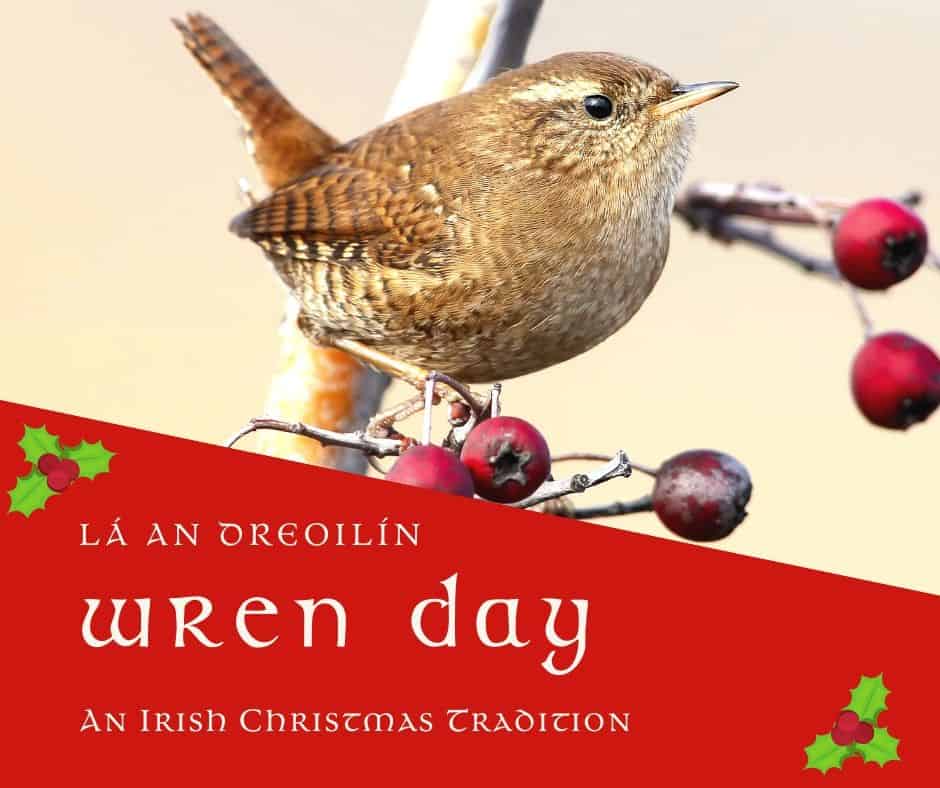














Pat Fordyce
I love your stories of holiday traditions! Happy New Year to you!🍾🎉
Irish American Mom
Hi Pat - New Year blessings to you and yours too. Thanks for all of your support over the past year and for checking out my recipes and ramblings so often.
All the best,
Mairéad
Penny
I have adopted a superstition for New Years Day but only because once I heard it, I couldn't reverse it.
That is "what you do on New years Day determines what you will be doing that year". It seems that my Grandfather worked for a man that believed this, so they worked a half day every January 1st to ensure
work and money the rest of the year. This story was repeated enough that it has taken root in me. Try as I might I can't help but consider the upcoming year that I am shaping on the first day of the year.
Happy New Year!
Irish American Mom
Hi Penny - I like your New Year's Day superstition. In ways it is related to the Irish custom of not spending money on the first day of the year to try to boost their resources for the coming year. But I prefer how your family like to work to set the tone for money and prosperity a plenty over the next 12 months.
Best wishes for a very happy New Year.
Mairéad
Jeff Ford
Thanks for sharing your thoughts and memories of what New Year's is like in Ireland. I always like learning about the land of my ancestors.
Irish American Mom
Hi Jeff - Happy New Year! I'm so glad my ramblings help connect you with your ancestral homeland.
Best wishes,
Mairéad
irishnannie
Learned a lot from you here...about the calendar thing.
My Dad brought our New Year's Eve tradition of "Beatin' out the hunger". or as you say, the bread thrown against the door, with him from Ireland (Cobh, County Cork). We continue that tradition to this day.
Your pictures are grand with all the little Leprechauns!
God bless you and thank you, Mairead!
Irish American Mom
Hi Irishannie - Love that your Dad brought this Irish New Year tradition with him to America and that you continue it to this very day. "Beatin' out the hunger" is a great name for the tradition.
Thanks as always for stopping by,
Best wishes,
Mairéad
Lynn
Happy New Year! Wishing health, happiness, peace, and prosperity to all!
I love customs to observe celebrations, so I'll take Irish customs when available, and customs from other countries and cultures when they traditionally aren't! 🙂
I'm just thankful for another year to enjoy my family, friends, nature, and life! 🙂
Irish American Mom
Hi Lynn - Thanks for stopping by to check out my ramblings and to read about New Year customs in Ireland.
Wishing you and your family the very best for 2023.
All the best,
Mairéad
bruce moorhead
I'm half Irish 1/4 Scotch and 1/4 French and I like your Irish Mom sooo much! keep sending all of everything that you do !
Irish American Mom
Hi Bruce - I'm so glad you enjoy my recipes and ramblings. Thanks for all your support and for following along. Best wishes for the New Year.
All the best,
Mairéad
Bernadette
Happy new year Mairéad! All the best & health to you and your family. I love the old superstitions and pagan origins. Very interesting stories!
Irish American Mom
Hi Bernadette - Many happy returns. I hope 2024 will be a great year for you. Thanks so much for following my recipes and ramblings.
All the best,
Mairéad